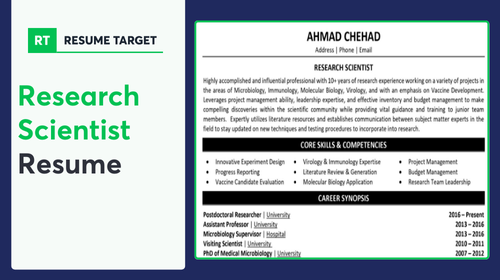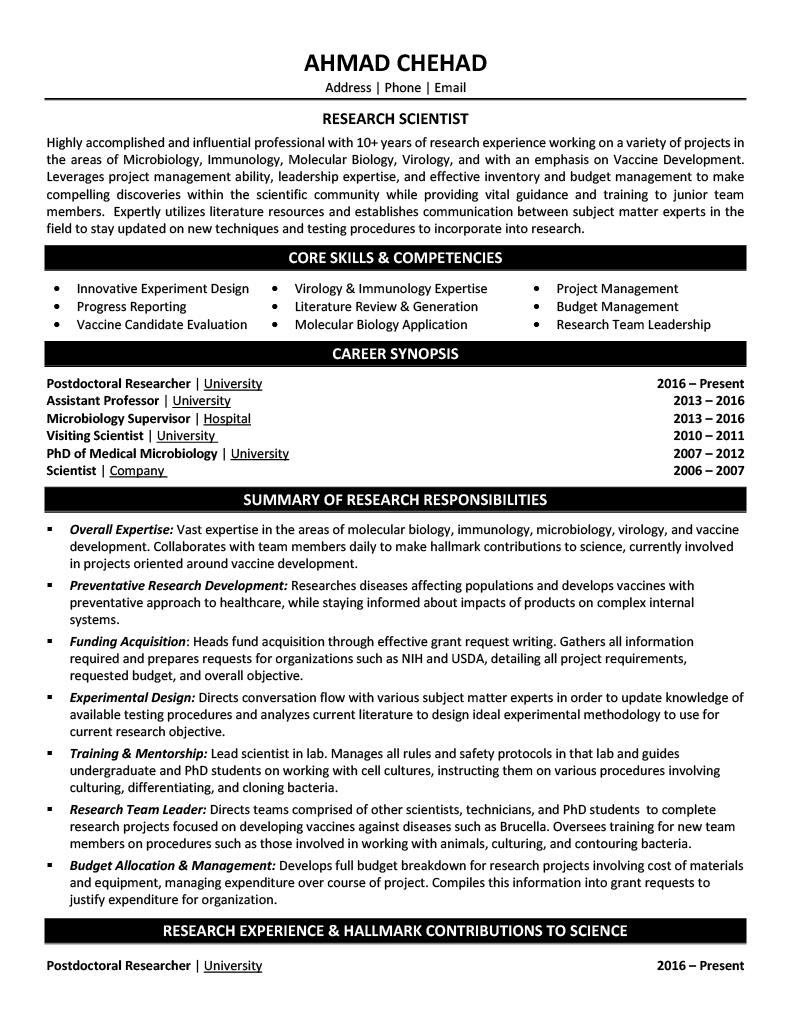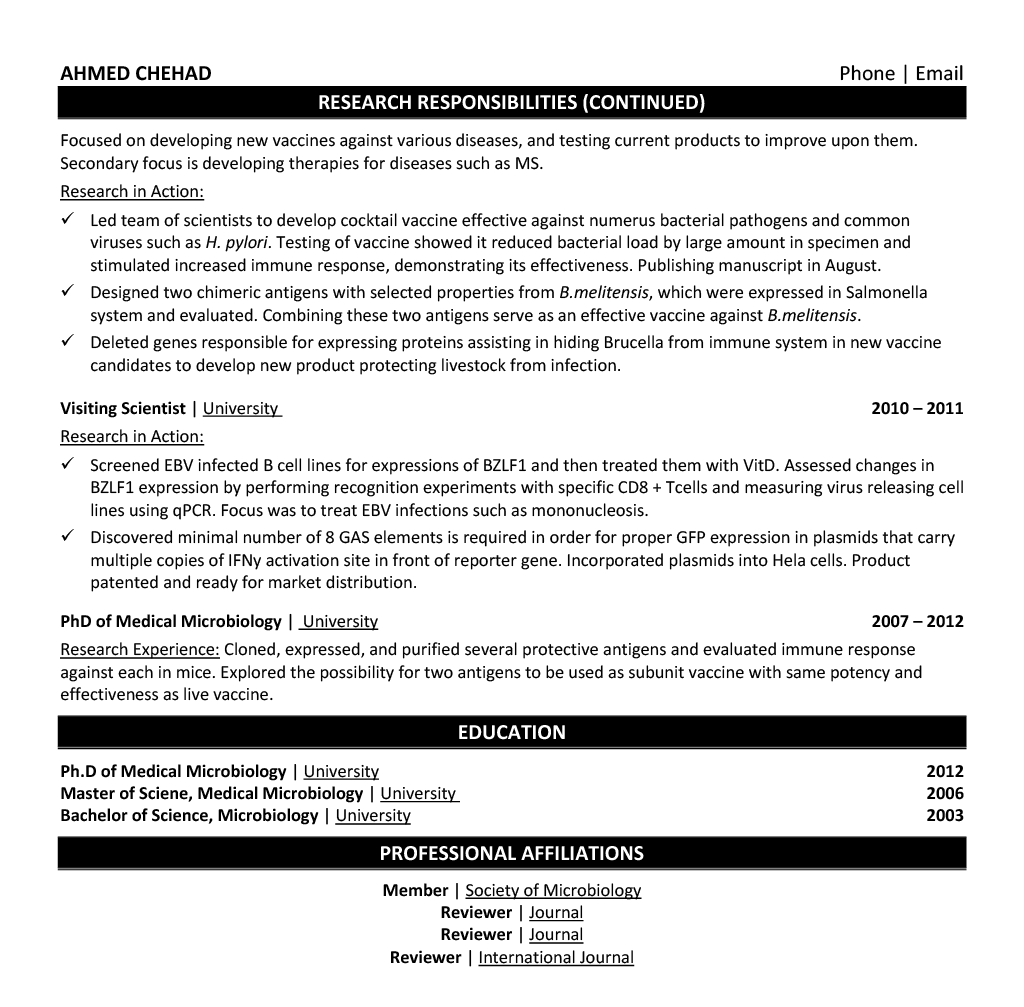

Groundbreaking research deserves more than a dry list of lab techniques. Your complex scientific achievements often get lost in technical jargon that hiring managers struggle to understand.
Are you finding it challenging to translate your research impact into compelling resume content? You need a strategic approach that balances scientific precision with clear, accessible language that demonstrates your real-world value.
Resume Target specializes in helping research scientists transform dense technical accomplishments into powerful career stories. This guide will show you exactly how to craft a resume that captures both your scientific expertise and your ability to drive meaningful research outcomes.


At the frontier of scientific discovery, Research Scientists are the modern-day explorers who transform curiosity into groundbreaking knowledge, with many dedicating their careers to developing new products and publishing groundbreaking findings that shape our understanding of the world.
Whether they're peering through microscopes in state-of-the-art laboratories or analyzing complex data sets on powerful computers, these professionals combine methodical experimentation with creative problem-solving to investigate everything from new medical treatments to renewable energy solutions.
If you're fascinated by the prospect of pushing the boundaries of human knowledge, the career path of a Research Scientist offers endless opportunities for growth, with advancement possibilities ranging from leading research teams to directing entire research and development departments.
Let's talk about the exciting earning potential in the Research Scientist field! Your career path as a Research Scientist offers impressive compensation that rewards your expertise and innovative thinking. And guess what? If you specialize in cutting-edge areas like Machine Learning or Cybersecurity, you can unlock even more earning potential.
Figures from: Coursera
Research Scientists can advance from entry-level positions to leadership roles through continuous learning and proven research impact. Your path typically starts with a bachelor's degree and progresses with advanced degrees and publications.
Beyond basic research abilities, your career advancement depends on mastering both technical expertise and leadership capabilities that drive innovation and team success.
- Advanced statistical analysis and data modeling - Scientific programming (Python, R, MATLAB) - Research methodology and experimental design - Project management and grant writing - Cross-functional team leadership - Scientific communication and presentation - Critical problem-solving - Collaborative mindsetLaunch your research science career by combining a strong educational foundation in STEM with hands-on laboratory experience, typically starting with a bachelor's degree in your chosen scientific field.
To advance in this field, you'll need to develop essential technical skills like statistical analysis and experimental design, along with crucial soft skills such as communication and project planning.
• Research Assistant • Laboratory Technician • Junior Scientist • Research Associate • Graduate Research FellowRequirements from Teal HQ
From biotech hubs to academic centers, Research Scientist roles are thriving in both coastal innovation corridors and emerging research clusters.
Figures from CBRE Life Sciences Research Talent Report
Struggling to translate years of complex laboratory work, published research, and technical expertise into a compelling research scientist resume that hiring managers will actually read? This comprehensive, section-by-section guide will help you craft a research scientist resume that effectively showcases your scientific achievements, methodological expertise, and research impact.
As a Research Scientist, you know how to break down complex data into clear findings, yet condensing your own career achievements into a powerful summary can feel surprisingly challenging.
While you excel at experimental design, statistical analysis, and driving breakthrough discoveries, translating these technical abilities into compelling career highlights requires a different skill set - one that helps hiring managers immediately recognize your potential to advance their research initiatives.
How would you describe your unique blend of scientific expertise and research methodologies that set you apart from other researchers in your field?
Reason: This helps establish your professional identity and research focus while differentiating you from other candidates. It allows you to showcase your specialized knowledge and approach to scientific investigation.
What overarching themes or patterns emerge when you consider the various research projects and scientific investigations you've led throughout your career?
Reason: This question helps you identify your consistent strengths and research interests, allowing you to craft a cohesive narrative about your scientific career trajectory and expertise.
How do you bridge the gap between complex scientific concepts and practical applications in your work, particularly when collaborating with cross-functional teams or stakeholders?
Reason: This highlights your ability to translate scientific work into valuable outcomes and demonstrates your communication skills, which are crucial for research scientists who must often work across disciplines and secure funding.
As a Research Scientist, you'll need to showcase both your advanced technical expertise and your ability to handle day-to-day laboratory operations, making it crucial to strike the right balance in your skills section.
Your skills list should highlight specialized research methodologies and analytical techniques you've mastered, while also demonstrating your proficiency in essential areas like data analysis, experimental design, and research protocol development.
Showcase your scientific expertise by organizing your research experience into three powerful sections: a concise role overview highlighting your research focus, quantifiable achievements demonstrating your impact, and core responsibilities that spotlight your technical and analytical capabilities.
Many Research Scientists struggle to translate complex laboratory discoveries and technical processes into clear, compelling achievements that resonate with hiring managers. Transform your research outcomes into powerful success stories by connecting your experimental breakthroughs and methodological innovations to measurable impacts on efficiency, cost savings, and scientific advancement.
The responsibilities section demonstrates how Research Scientists drive innovation and discovery beyond routine lab work. This section must translate complex scientific processes into clear achievements that hiring managers can understand, while showing how your research contributes to organizational goals and scientific advancement.
Your advanced degrees and specialized certifications are crucial assets in the research science field. Focus on highlighting your highest academic achievements first, followed by any relevant professional certifications that demonstrate your expertise in laboratory techniques, data analysis, or specific research methodologies.
Now that you've built a strong foundation using Resume Target's comprehensive resume writing guidelines, you're ready to transform your CV into a powerful tool for landing research positions.
While many scientists focus solely on customizing their cover letters, tailoring your research resume for each position is equally crucial for showcasing your specific expertise, whether it's in biochemistry, materials science, or other specialized fields.
A customized research scientist resume not only helps you navigate through ATS systems by incorporating relevant keywords, but it also demonstrates to hiring managers how your unique research experience, publications, and technical skills align perfectly with their laboratory's needs and ongoing projects.
Ready to stand out in the competitive scientific community? Let's transform your research scientist resume into a precision instrument that opens doors to your dream laboratory position!
Don't let a lack of professional lab experience hold you back! Your journey to becoming a Research Scientist can start with a strong resume that showcases your academic achievements.
Instead of dwelling on unrelated work history, you'll want to emphasize your research methods coursework, laboratory skills, and any research projects or internships you've completed.
Focus on highlighting your analytical abilities, technical laboratory proficiency, and research methodology expertise to stand out.
For more detailed guidance on structuring your academic achievements and research experience, check out the Student Resume Writing Guide.
Your research summary is your chance to showcase the valuable laboratory skills, research methodologies, and analytical capabilities you've developed through your academic career and internships.
Focus on highlighting specific research projects, published works, and technical proficiencies that demonstrate your readiness to contribute to meaningful scientific discoveries.
"Detail-oriented and methodical Research Scientist with extensive academic research experience in molecular biology and data analysis. Contributed to three peer-reviewed publications while maintaining precise laboratory protocols and documentation standards. Proficient in advanced microscopy techniques, statistical analysis software, and experimental design methodologies. Seeking to leverage strong analytical skills and research background to drive innovative scientific discoveries in a dynamic research environment."
Now's your chance to showcase the rigorous academic foundation that prepared you for groundbreaking scientific research - turn those years of specialized study into compelling proof of your expertise!
Don't just list your degrees - highlight relevant advanced coursework like research methodologies and specialized lab techniques, plus include standout research projects that demonstrate your ability to design studies, analyze complex data, and contribute meaningful findings to your field.
1. Courses common to a degree/certification for Research Scientists include teaching skills, writing for research papers and grants, advanced mathematics courses, and public speaking classes [1].Relevant Coursework: Advanced Research Methodology | Scientific Writing and Communication | Advanced Statistical Analysis | Research Ethics and Compliance | Grant Writing Fundamentals | Laboratory Management
Key Projects:
Novel Drug Delivery System Development: Led investigation into innovative nanoparticle-based drug delivery mechanisms for enhanced therapeutic efficacy in cancer treatment applications.
Biomarker Discovery Research: Collaborated with cross-functional team to identify and validate novel biomarkers for early-stage disease detection.
Leverage your academic background, laboratory experience, and research methodologies by showcasing the technical and analytical skills you've developed through your education, internships, and research projects to create a compelling skills section that catches employers' attention.
As an entry-level Research Scientist, your combination of technical expertise and analytical capabilities positions you well for roles in both academic and industrial research settings, where the demand for skilled scientists continues to grow across multiple sectors.
When you're deep in the lab making breakthrough discoveries, the last thing you want to worry about is how to translate years of complex research protocols and methodologies into language that hiring managers can quickly grasp.
At Resume Target, we specialize in crafting research scientist resumes that bridge the gap between technical expertise and clear business value, having helped countless PhDs and research professionals showcase their impact.
Our deep understanding of the scientific community means we know exactly how to position your publications, grants, and research outcomes to catch attention in both academic and industry settings.
With increased competition for research funding and positions across all scientific disciplines, now is the time to ensure your resume opens the right doors - let's connect today to transform your research story into a powerful career tool.
Impress any hiring manager with our Scientist resume writing service. We work with all career levels and types of Scientist professionals.
Learn More → Scientist Resume Writing Services